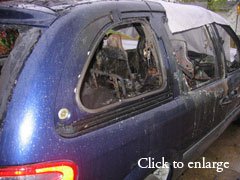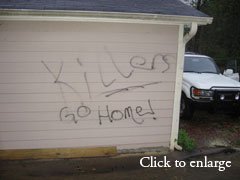Sania Kamran says it all began at Wal-Mart.
The 27-year-old mother of four lives in Douglasville, Georgia, about 45 minutes from Atlanta. Born in Pennsylvania, she describes herself as “white, blond hair, blue eyes.” She says she’s been a Muslim for about five years, and she’s married to a Muslim man who came here from Pakistan.
She shops at her local Wal-Mart several times a week, she says, and it was there that she began noticing the hostility of other customers.
Over the course of several months, she says she saw “that snide look” when she was at the store with her young children and her husband, since they are all darker than she is.
And she says some people would comment on her Muslim attire and ask, “How could you wear something like that?”
Or, she says, they would ask, “Don’t you feel bad for making your daughter dress that way?”
But she endured these slings until one day in late March.
Here’s the Wal-Mart encounter, as she recalls it:
“A customer, an older lady in her mid-60s, says, ‘Ma’am, where are you from?’ ”
“I say, ‘Pittsburgh, P.A.’ ”
“Where is your husband from?”
“Pakistan.”
“You ought to be ashamed of yourself then.”
“Why should I be ashamed of myself?”
“Because our forefathers died to give us the rights and freedoms we have, and you’re giving it all up by being a Muslim.”
Kamran says she responded by saying that her father was a Vietnam vet, and that he also served in the Gulf War and Desert Storm. “He served our country for 26 years,” she recalls saying. “Because of people like my father and others, I have the right to choose who I’m going to pray to and who I’m going to be.”
After the conversation ended, Kamran says she didn’t pay any mind to it.
Until, that is, a few days later.
She was back at Wal-Mart, and when she walked out to the parking lot, she noticed something. “I went to open up the hatch to our van and in the dust on the window they’d written ‘Killers.’ ”
She thinks it might have had something to do with the fact that she had “Proud2B a Muslim” written on her license plate frame.
“I was disgusted,” she says. “Someone touched my property that had no right to.”
She drove home, she says, and called her husband, and he told her to “wash it off and just let it go.”
At that point, she says she wasn’t scared. “OK, they wrote on my car. No big deal,” she remembers feeling.
But then, about a week later, in the early morning hours of April 8, it became a big deal.
“I woke up to nurse my eight-month-old,” she recalls. “While I was feeding him, I heard like a pop. I wasn’t sure what it was. At first, I thought it was my neighbor’s car door. Then I saw a flicker, like a flame. I thought some idiot had lit our garbage can as a prank. But then I saw smoke coming out of my van, and I screamed for my husband.”
They called 911, and then sat on their front steps and watched the van burn, she says.
One fireman drew their attention to something else. “He pointed to our garage, and they had spray-painted across it, ‘Killers go home.’ ”
“It felt as if someone had just kicked us in the gut,” she says. “What had we done to anybody to deserve that? I sat on our front stoop crying my eyes out.”
Kamran says the Douglas County police have been slow to investigate, but the FBI is now on the case.
Calls to the Douglas County police were not returned.
According to an AP story, “Douglas County Chief Deputy Stan Copeland said evidence from the scene has been submitted to the state crime lab and that police patrols in the neighborhood have been stepped up.”
The FBI acknowledges that it is looking into the incident.
“The preliminary investigation is still ongoing," says Special Agent Stephen Emmett, spokesperson for the FBI's Atlanta office. "Upon its conclusion, it will be forwarded to the civil rights division of the Department of Justice in Washington, D.C., for review.”
Ibrahim Hooper, communications director of the Council on American-Islamic Relations, says the incident is an example of “growing Islamophobia.”
Kamran says she is no longer wearing Muslim garb. “We can’t afford to lose another vehicle,” she says. “It makes me mad. I’m proud to be who I am and what I am. I shouldn’t have to be a Muslim in secret. But my husband said I know who I am inside, and I don’t need to advertise it to everybody else.”
She wishes, though, that “people would read about our religion and not just believe what they hear on TV,” she says. “Everyone thinks now that I’m a Muslim I’m oppressed. It’s not like that.” She says she was married before, to a Methodist, which was her religion at the time, too. “He treated me bad,” she says. “My husband treats me wonderfully.”
She says her experience has opened her eyes. “It wasn’t until I became Muslim that I realized what other minorities feel,”
she says. “And it’s pathetic.”
Today, she thinks she safe in her home. “Maybe it’s a false sense of security,” she adds. “But when I go outside, I am fearful. I don’t know what, if anything, they’ll do next. My oldest kid is supposed to go to school in August, and we’re second-thinking that.”
She says her neighbors have been very nice, though.
“One lady up the street went to a honey-baked ham place and got us a turkey dinner with a green bean casserole and a sweet potato pie," she says. “Another neighbor purchased three new car seats for us since our old ones were burned up in the van. And another gave us a $100 disc player.”

